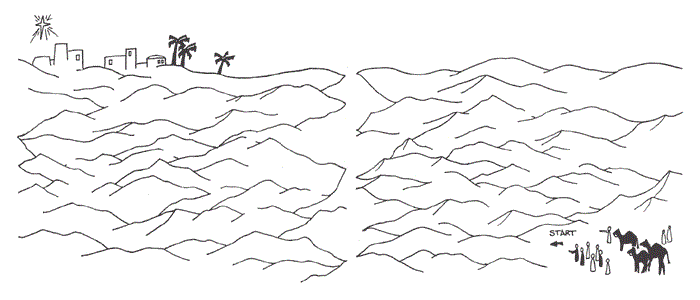‘A cold coming we had of it,’ says T.S. Eliot’s magus. ‘Just the worst time of the year for a journey, and such a long journey’. His grumbling sticks in my head on sharp days, alongside the quiet despair of Judas in James Wright’s sonnet. But it’s Advent now, not Lent (even if birth and death blur when held up close in this kingdom), so come and read Eliot’s poem with me.
Journey of the Magi
‘A cold coming we had of it,
Just the worst time of the year
For a journey, and such a long journey:
The ways deep and the weather sharp,
The very dead of winter.’
And the camels galled, sore-footed, refractory,
Lying down in the melting snow.
There were times we regretted
The summer palaces on slopes, the terraces,
And the silken girls bringing sherbet.
Then the camel men cursing and grumbling
And running away, and wanting their liquor and women,
And the night-fires going out, and the lack of shelters,
And the cities hostile and the towns unfriendly
And the villages dirty and charging high prices:
A hard time we had of it.
At the end we preferred to travel all night,
Sleeping in snatches,
With the voices singing in our ears, saying
That this was all folly.
Then at dawn we came down to a temperate valley,
Wet, below the snow line, smelling of vegetation;
With a running stream and a water-mill beating the darkness,
And three trees on the low sky,
And an old white horse galloped away in the meadow.
Then we came to a tavern with vine-leaves over the lintel,
Six hands at an open door dicing for pieces of silver,
And feet kicking the empty wine-skins,
But there was no information, and so we continued
And arrived at evening, not a moment too soon
Finding the place; it was (you may say) satisfactory.
All this was a long time ago, I remember,
And I would do it again, but set down
This, set down
This: were we led all that way for
Birth or Death? There was a Birth, certainly,
We had evidence and no doubt. I had seen birth and death,
But had thought they were different; this Birth was
Hard and bitter agony for us, like Death, our death.
We returned to our places, these Kingdoms,
But no longer at ease here, in the old dispensation,
With an alien people clutching their gods.
I should be glad of another death.
.
.
How are we to read something like this?
‘I had seen birth and death,’ the old man says, ‘but had thought they were different’. That’s the problem with this kingdom. This birth we’re called to witness, this birth we celebrate and wait for, the Christ-Child wet and bloody and crying in the night, cradled by stars and crooning angels and the soft, deflated belly of Mary – O come, O come Emmanuel, we chorus, and we are carolling for our death.
Ransom captive Israel. Come back soon. Come, Lord Jesus. We forget, we forget so very easily in the warm smell of cinnamon and the spangling trees and the safe, worn face of the nativity baby that we are asking for death, our own personal Death who comes to take us carefully and inexorably apart, to crush our illusions and set us on fire and drown us until the old Adam ceases, finally, to swim.
That summons to take up our own instrument of torture is not offered lightly. We are compared to seeds dying, our burial is casually discussed and has anybody else noticed that when we talk about the Spirit as setting our hearts on fire, we’re talking about a substance that destroys what it burns? Burning, the last time I checked, hurts.
When we welcome in the Christ-Child, when we long for his return, we welcome and long for the destruction of who we are, that slow loss and irreparable change of everything we’ve known ourselves to be. Creation and destruction are the same bloody coin in this kingdom. Transformation is another word for death here, even if it’s the everyday kind of death that we learn (reluctantly, eventually, with much complaining and the provoking work of the Spirit) to want. And it’s with this new life here amid the crowding of angels and the heavy wet smell of cows that our dying begins, because this was where his began. So here is where our rebirth begins too, even before the rattle of silver and the six hands throwing dice, the God-man wet and bloody and crying in the afternoon.
So yes, Eliot’s magus is correct. It’s a hard and bitter agony for everyone involved in this strange birth, because resurrection unfortunately requires one to die first. And it’s such a long journey, and the weather is ghastly, and the road potholed and the circumstances hostile and the days unfriendly, and we do a hell of a lot of grumbling and regretting along the way. But new life begins here all the same, when the God who was born as one of us welcomed in his own death for the sake of our birth, a birth which comes for us on the other side of his dying. And look, we too are invited by his Spirit into that same dying, and for that same end, which is not so much an end as it is a beginning.

